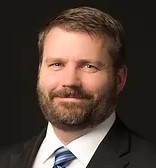In Defense of the Prosecutor by Christopher D. Boyd
/*! elementor – v3.21.0 – 30-04-2024 */
.elementor-widget-image{text-align:center}.elementor-widget-image a{display:inline-block}.elementor-widget-image a img[src$=”.svg”]{width:48px}.elementor-widget-image img{vertical-align:middle;display:inline-block} 
by Christopher D. Boyd
Over the past decade we have witnessed the rise of troubling narratives about the American prosecutor. Prominent national organizations like the ACLU blame prosecutors for mass incarceration and “ruining lives,” claiming they can rectify the “harm they’ve caused” by, among other things, “sentencing reductions.”[i] Entertainment and media, like the series Making a Murderer, present one-sided, emotionally manipulative takes on the justice system and prosecutors as a whole. Some narratives have become popular wherein many prosecutors are painted as villains, and many defendants as railroaded innocents.
These narratives threaten much worse than mere decline in morale for prosecutors. They threaten the whole point of the justice system, “that guilt shall not escape, nor innocence suffer.”[ii] Villainous prosecutor narratives hurt the entire judicial department’s efforts to hold offenders accountable. Serious efforts are made to ensure that defendants are presumed innocent and that the burden of proof remains with the prosecutor.[iii] Appropriately so. Yet the rising danger of naming the prosecutor a villain has gone largely unaddressed. This should change. It is not by accident that in Idaho, prosecuting attorneys are officers of the Judicial Department.[iv]
Idaho’s Bar and its Courts should resist these narratives that claim the prosecutor’s role is villainous. The entire judicial system loses integrity if prosecutors are assumed to be such. Instead, we should: (1) change the judicial labels of “misconduct” to “error” where appropriate, (2) hold ourselves to a higher standard, and (3) encourage fairness in the narrative.
Change Judicial Labels: Error Isn’t Always Misconduct
The term “prosecutorial misconduct” is one that necessarily invokes a large body of law intended to protect a defendant’s constitutional rights against an unfair trial or other prosecutorial actions.[v] While it may be intended as a legal term of art, it invokes visceral reactions from defendant and prosecutor alike. The dictionary definition of “misconduct” includes not merely improper behavior, but intentional wrongdoing, deliberate violations of law, and malfeasance.[vi]
There is a real cost to the linguistic oversimplification. It has the dual impact of (1) watering down actual misconduct, which should be addressed with the seriousness that it deserves, and (2) placing a label of deliberate “misconduct” upon even inadvertent mistakes. Idaho’s jurisprudential language unfortunately reinforces this phenomenon. An inadvertent error by an inexperienced prosecutor receives the same label as deliberately abusive trial behavior or even willful misrepresentations – all are labeled “prosecutorial misconduct.”
Our Courts would do better to reserve that label for intentionally abusive conduct. Lumping the unintentional error in with intentional abuses serves only to undermine confidence in the judiciary and dishearten the prosecutors charged with fair dispensation of justice. A prosecutor’s genuine mistakes can be corrected on appeal using more descriptive terms than prosecutorial misconduct. Would not “prosecutorial error” be more judicious in instances of inadvertent mistakes? When mistakes are made in the civil realm, or even by judges in the criminal realm, such mistakes are given the benefit of being labeled errors rather than uniformly being called misconduct. Such consideration ought to be extended by Courts to their prosecutorial officers.
Hold Ourselves to a Higher Standard
In the rare instances where actual misconduct is found, the best way to combat these narratives that prosecutors are shadowy operators who can act with impunity is to hold ourselves to a higher standard. Idaho’s elected Prosecuting Attorneys have a key role to play in ensuring that ethical principles are followed by their deputies. If we wish to keep the public’s confidence, we must be rigorous in demanding high standards of ethical conduct from ourselves.
Prosecutors wield a tremendous amount of power in our roles. Judges rely on the representations of prosecutors when they seek search warrants, arrest warrants, and bring criminal charges. When a prosecutor willfully misrepresents factual information to a judge in seeking the arrest, detention, or criminal charging of a citizen, that prosecutor should be swiftly terminated – at a minimum. We can resist the narratives of the villainous prosecutor only if we transparently eject those who misuse the office from among ourselves. We must demonstrate that we believe the mantra that we “may strike hard blows…” but we are “not at liberty to strike foul ones.”[vii] While the overwhelming majority of prosecutors are fulfilling their duty, if there is even one found to be engaging in misconduct, that one should not be allowed to tarnish prosecutors as a whole. We as prosecutors must hold ourselves to the highest ethical standards if we hope to combat villainous-prosecutor narratives.
Encourage Fairness in the Narrative
It can hardly be expected of lawyers – who have a duty to act as advocates – to consistently harmonize always with their party-opponents. But just as every prosecutor should defend the sacred and necessary role of the defense attorney, so too should the defense bar resist the urge to paint all prosecutors, who are officers of the court, with a broad brush and assume bad intent. Similarly, judges should defend equally the role of prosecutors and defense attorneys in the court system. A measured comment from a defense attorney or judge about the proper role of the prosecutor goes a long way to temper emotion. Hesitation and due consideration before assuming the worst intentions of prosecutors would help.
We should encourage fairness in response to prosecutor-villain narratives – our personal experiences with good, ethical prosecutors should be recounted and retold to the public. Good prosecutors – those who take seriously their sacred obligation to support and defend the Constitution; who diligently safeguard the procedural due process rights of those who have been accused, even as they vigorously hold them accountable under the law; and who temper justice with mercy where appropriate – should be lauded and encouraged.
/*! elementor – v3.21.0 – 30-04-2024 */
.elementor-widget-image-box .elementor-image-box-content{width:100%}@media (min-width:768px){.elementor-widget-image-box.elementor-position-left .elementor-image-box-wrapper,.elementor-widget-image-box.elementor-position-right .elementor-image-box-wrapper{display:flex}.elementor-widget-image-box.elementor-position-right .elementor-image-box-wrapper{text-align:end;flex-direction:row-reverse}.elementor-widget-image-box.elementor-position-left .elementor-image-box-wrapper{text-align:start;flex-direction:row}.elementor-widget-image-box.elementor-position-top .elementor-image-box-img{margin:auto}.elementor-widget-image-box.elementor-vertical-align-top .elementor-image-box-wrapper{align-items:flex-start}.elementor-widget-image-box.elementor-vertical-align-middle .elementor-image-box-wrapper{align-items:center}.elementor-widget-image-box.elementor-vertical-align-bottom .elementor-image-box-wrapper{align-items:flex-end}}@media (max-width:767px){.elementor-widget-image-box .elementor-image-box-img{margin-left:auto!important;margin-right:auto!important;margin-bottom:15px}}.elementor-widget-image-box .elementor-image-box-img{display:inline-block}.elementor-widget-image-box .elementor-image-box-title a{color:inherit}.elementor-widget-image-box .elementor-image-box-wrapper{text-align:center}.elementor-widget-image-box .elementor-image-box-description{margin:0}

Christopher D. Boyd
Chris Boyd has served as the Adams County Prosecutor for the past six years. He began his prosecuting career in 2013 at Canyon County, where he served as a deputy for just under five years. He is an Iraq war veteran and graduate of University of Idaho College of Law. He lives in Nampa with his wife and five children.
[i] https://www.aclu.org/news/smart-justice/our-vision-to-transform-what-it-means-to-be-a-prosecutor.
[ii] Berger v. United States, 295 U.S. 78, 88, 55 S. Ct. 629, 633 (1935).
[iii] Idaho Criminal Jury Instruction (ADD).
[iv] Idaho Const. Art. V Judicial Department, § 18 Prosecuting Attorneys.
[v] State v. Diaz, 163 Idaho 165, 168, 408 P.3d 920, 923 (Ct. App. 2017).
[vi] Merriam Webster Dictionary Online, Mar. 2024, https://www.merriam-webster.com/dictionary/misconduct.
[vii] Berger v. United States, 295 U.S. 78, 88, 55 S. Ct. 629, 633 (1935).

